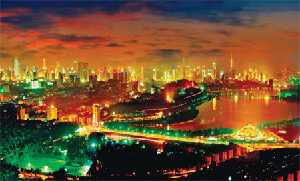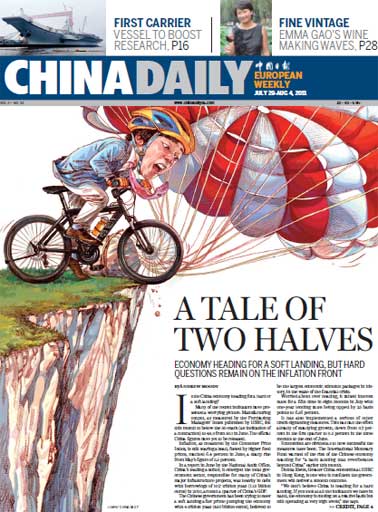Op-Ed Contributors
Debate: High-speed trains
Updated: 2011-07-29 07:49
(China Daily)
Andre Vltchek
Criticism of China out of context
The deadliest high-speed train accident took place near the village of Eschede in Celle district of Lower Saxony, Germany, on June 3, 1998. It claimed 101 lives.
It is worth going back to the news reports from that time. International news agencies and newspapers expressed shock and sympathy, and tried to analyze the disaster. The accident did very little to evoke criticism of Germany's political or economic system in general or its approach toward railroads in particular.
In fact, many state-owned railways in Europe have been privatized in recent years. And the number of accidents have increased dramatically as railways suddenly came to be seen as something that should yield profit.
Let's move to Wenzhou in China's Zhejiang province, the scene of the bullet train accident on the night of July 23 in which 39 people were killed. It was an accident, terrible and regrettable, but definitely not extraordinary. Simple per capita calculations show China's rail system still appears to be a lot safer than that of Germany, Italy or Spain, not to speak of India or Indonesia.
But objectivity is not something that the Western media have in mind when covering events in China. Immediately after the accident, Western and Japanese propaganda went to work. Many Western reports were tailored to show that what had happened in China was something exceptional, which could rarely happen anywhere else in world. It is a common approach used in anti-Chinese propaganda, and its main goal is to discredit China's achievements.
In this case, a random look at just a few of the many train disasters in recent times could reveal the absurdity of the claims or suggestions that China's railways is hazardous or that it is being developed without safety concerns:
April 25, 2005: A train derails on a sharp curve and smashes into an apartment building in Amagasaki, Hyogo, Japan, killing 107 people and leaving 549 injured;
September 22, 2006: A train accident in Lathen, Emsland, Germany, kills 21 passengers and two maintenance workers and injures many more;
September 12, 2008: A train collision in Chatsworth, California, US, leaves 25 people dead and about 135 injured;
February 15, 2010: Two passenger trains collide head-on in Buizingen near Brussels, Belgium, killing 18 people and leaving 162 wounded.
Disasters are varied, often unpredictable, no matter how much effort we make to prevent them. Tragedies strike every year in rich European countries and in the United States. Poor countries like India and Indonesia lose dozens of lives almost every month to train accidents.
In the month preceding the Wenzhou tragedy, train accidents killed several people in the US, including 6 in Nevada on June 24, one in Maine on July 12 and two near Chicago on July 21. On July 10, the Kalka Mail derailed in Uttar Pradesh, India, killing about 70 people.
Yet no one ran the accidents as top international stories and no one questioned the entire European, American or Indian system because of failed safety systems or faulty tracks. It appears that anything that can hurt the credibility of China is immediately identified and inflated by Western propaganda.
A massive drive to connect people of a great nation by the greatest and fastest railway system has been inspiring millions worldwide, especially in the developing world. It is environmentally sound and a proof of how far Chinese technology has progressed in recent years.
China's railways - including the 8,000 kilometers of high-speed tracks - is symbolic of the changing world. It symbolizes the rise of not only China, but also a new Asia, bold and confident, proud and daring.
What the Western media have not said while criticizing China for the Wenzhou accident is that the high-speed rail system would still be saving thousands of lives, for bad infrastructure kills. For years, I have been living and working in developing countries. I have driven all over Africa, Indonesia, Bangladesh and Central America. In Uganda or Kenya, I have seen more fatalities on terrible roads, just driving 500 km. In Indonesia, people drown after their horrid ferries sink, they fall though rusty roofs or from trains to the more rusty floors to their death. Bad roads, railways, waterways and other modes of transportation kill tens of thousands of people a year in countries like India, Bangladesh and Indonesia.
If the most populated country has to depend on outmoded road transport and an outdated rail system, it would probably lose hundreds of thousands of people every year. This fact alone justifies the rapid expansion of the fast railway system in China. Safety standards should improve in China, as they should everywhere in the world. But it should not overshadow the fact that what China has built is one of the safest and most efficient transport networks on earth. Any basic statistical calculation would support this claim.
High-speed train tragedies are very dramatic, and tragic. They appear horrifying on television screens. So are plane crashes. Still, nobody would deny that it is safer to fly than to ride a motorbike.
Logic demands that China be saluted for its success in the fast rail system. It should be encouraged, too, because fast train networks not only improve lives, but also save lives and protect the environment. Accidents should be met with grief, but frankly speaking, they change nothing about correctness of a course. There is and should be no going back on the fast rail network for China.
The author is an American novelist, documentary filmmaker and investigative journalist.
E-paper

Ringing success
Domestic firms make hay as shopping spree by middle class consumers keeps cash registers ringing in Nanjing
Mixed Results
Crowning achievement
Living happily ever after
Specials

Ciao, Yao
Yao Ming announced his retirement from basketball, staging an emotional end to a glorious career.

Going the distance
British fitness coach comes to terms with tragedy through life changes

Turning up the heat
Traditional Chinese medicine using moxa, or mugwort herb, is once again becoming fashionable
